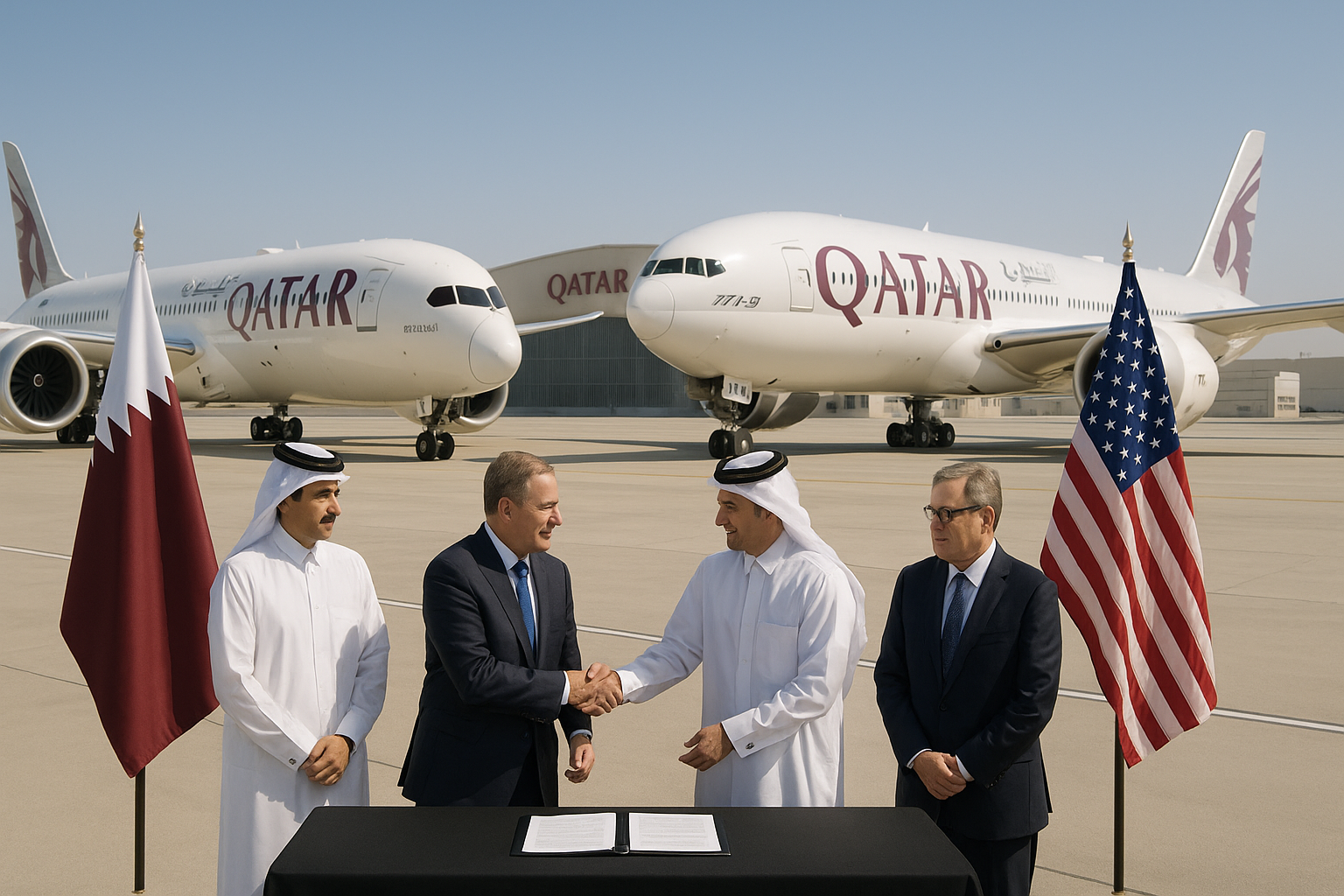Qatar Airways just handed Boeing what amounts to a corporate defibrillator shock. The Middle Eastern carrier announced plans to buy up to 210 jets from the struggling American manufacturer – 130 Dreamliners and 30 of those perpetually-delayed 777-9s, with options for 50 more planes down the road.
This is Boeing's largest-ever widebody order. Talk about timing – the company desperately needed some good news after years of safety nightmares, production headaches, and watching their CEO head for the exit.
The ripple effects extend beyond Boeing. GE Aerospace is celebrating too, having secured an order for more than 400 engines. Their biggest widebody engine deal ever, they're quick to point out. When everyone's breaking records at once, you know there's more to the story.
Let's be real about what's happening here. Aircraft deals of this magnitude aren't just business transactions – they're exercises in international diplomacy, industrial policy, and strategic positioning all rolled into one expensive package.
The political overtones? Unmistakable. Boeing's CEO Kelly Ortberg stood shoulder-to-shoulder with former President Trump at the signing ceremony in Doha. That wasn't coincidence. Having covered Gulf aviation for years, I've seen how Qatar meticulously cultivates relationships across America's political spectrum. They understand a fundamental truth: no matter who's in the White House, having billion-dollar ties to U.S. industry creates a kind of insurance policy.
I think of it as "commercial diplomacy optionality." These Gulf carriers have mastered the art of making massive purchases that serve multiple strategic goals simultaneously. They get the planes they need while generating enormous goodwill with industrial powerhouses and their political backers.
For Boeing, man, did they need this vote of confidence. After the 737 MAX disasters, that Alaska Airlines door blowing out mid-flight, and quality control issues that would make your head spin... their reputation has taken repeated body blows. Qatar Airways stepping up signals to other potential customers that one of aviation's pickiest buyers still believes Boeing can deliver.
The Airbus angle shouldn't be overlooked, either. Qatar and Airbus had an ugly, public falling-out over surface quality issues with A350 aircraft. The dispute got nasty, ending in legal action that was eventually settled. But wounds like that don't heal quickly. This Boeing order? You could read it as Qatar sending a not-so-subtle message about what happens when you cross one of aviation's most prestigious customers.
From Qatar's perspective, the massive order fits perfectly with their national strategy of punching way above their weight internationally. We're talking about a country with fewer than 3 million residents (smaller than most major cities) but blessed with enormous natural gas wealth. They've consistently leveraged those resources to secure global influence – building investments in everything from London real estate to hosting the 2022 World Cup.
Look, there are legitimate business reasons too. Qatar Airways' CEO mentioned meeting "strong demand" as the airline connects passengers "better than anyone." Their entire business model depends on having a modern, efficient long-haul fleet to funnel travelers between continents via their Doha hub.
The GE engine order deserves more attention than it's getting. In today's aerospace industry, securing engine production slots might actually be harder than getting the airframes themselves. The engine bottleneck has become so severe it's causing delivery delays across the industry. Qatar's massive upfront order essentially locks in future capacity – smart move in a constrained market.
So what does all this mean? For one thing, it suggests that despite Boeing's troubles (and there are many), the commercial aircraft duopoly remains extraordinarily resilient. Airlines simply don't have many options when shopping for large widebody aircraft. This order reinforces Boeing's position as one of just two companies that can meet these specialized needs.
It also highlights something I've observed repeatedly covering these mega-deals: the inescapable intertwining of government relations and industrial policy. When sovereign wealth meets national champions and critical export industries, business decisions inevitably take on political dimensions. Not suggesting anything improper – just acknowledging reality at this scale.
For investors watching Boeing, the deal provides much-needed stability in their order backlog, though... let's not kid ourselves. The real challenge remains fixing those production issues and restoring consistent quality. No amount of new orders helps if you can't actually deliver reliable aircraft on schedule.
In the meantime, Qatar gets its planes (eventually), Boeing gets a desperately needed PR win, GE books a record engine order, and various political figures get their photo ops. Everyone wins? Well, except perhaps Airbus, which watches a competitor land a historic deal with a former customer they managed to alienate.
Sometimes in business, the lesson is simple: keep your customers happy. Especially when they have billions to spend.
